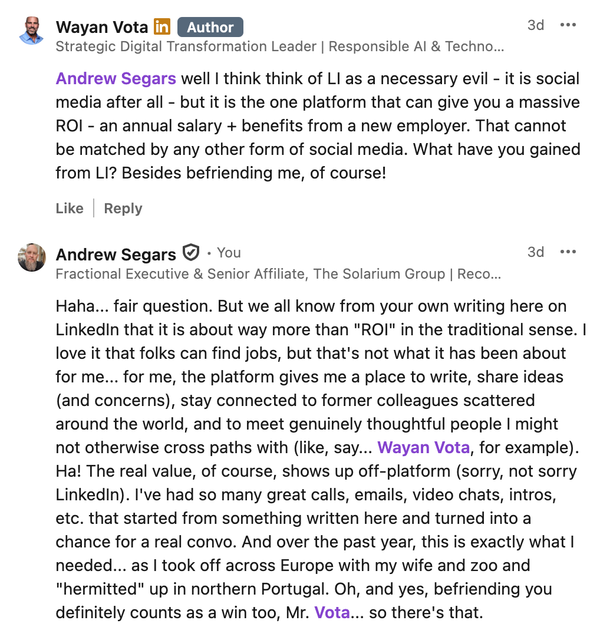Ride the Wave: How to Thrive in Unexpected Career Transitions
Let’s talk about thriving in uncertainty. Because whether it’s a career shift, a reinvention, or a complete pivot, we all face unexpected change. And we all have a choice in how we respond.

I’m getting ready to lose my job. Very soon. Could be today or tomorrow, in fact.
Yep. I’m still letting that unpleasant, unexpected fact sink in. It’s not fun, of course, but here we are.
Many of you have been (or currently are) exactly where I am—many of you quite recently. I feel you.
But this isn’t a pity party. This isn’t about blame (well, not this article anyway…ahem). It’s about moving forward…with confidence, even enthusiasm.
Too soon, you say? Never too soon, I say.
I’ll be honest—I’m stressed. The emotional rollercoaster has been intense, truly intense, and I fully expect more loops and twists and white-knucke plunges ahead. My career—the one I’ve invested decades in—is coming to a screeching, unexpected halt. Probably. But despite the frustration, I keep circling back to something surprising: optimism.
Not necessarily for the industry I dedicated so much to, but for myself. Selfish? Maybe. Necessary? Absolutely.
I don’t want this. No one wants this. But for the things I can control, I’m taking the reins. Because here’s what I know: I’ll get through this. I’ve faced transitions before—relocations, career shifts, reinventions. Each time, I came out stronger (and certainly wiser). This time will be no different.
This whole situation reminds me of a lesson I learned very early in life, as a military brat: change is inevitable, and often unpredictable. The only thing that truly matters is how we handle it. Moving from place to place, adapting, making new friends, saying goodbyes—it all became second nature. Later, as an international development professional and diplomat, I lived that reality on a global scale, navigating shifting priorities, new cultures, and unexpected challenges.
And now? Now I get to do it all over again.
But here’s the thing—my wife and I have been cooking up (literally and figuratively) a plan. A plan that has been brewing in the background for a long time. And the hope (and damn expectation) is, a year from now, we’ll look back at this moment and ask, Why didn’t we do this sooner?
So let’s talk about thriving in uncertainty. Because whether it’s a career shift, a reinvention, or a complete pivot, we all face unexpected change. And we all have a choice in how we respond.
1. Change Is a Way of Life: A Military Brat’s Perspective
Some people grow up in one house, go to one school, and have childhood friends who last a lifetime. At various points in my life, I envied these people. I grew up knowing that "home" was temporary, wherever the movers unpacked the last box. It wasn’t good or bad—it just was.
When you're a military kid, you learn early that adaptability isn’t optional—it’s survival. You land in a new school, figure out the social hierarchy, and learn that playground rules change from base to base. Turns out, those same skills apply to a global career—and to job loss. Because no job, title, or office is permanent. The sooner we embrace change (even unexpected or unpleasant change) as an opportunity instead of a threat, the more control we regain over our future, and dare I say our own mental wellbeing.
2. The Emotional Toll of Unexpected Transitions
Let’s be real—losing a job (or anticipating one) comes with all the emotions.
☑️ Shock? Check.
☑️ Confusion. Yep.
☑️ Anger? Check.
☑️ Panic? Double check.
☑️ Staring blankly at LinkedIn postings wondering if you should become a professional panda nanny? Absolutely.
Here’s what we all know, but sometimes forget to acknowledge: these feelings are normal. Absolutely normal. What’s not helpful is letting them paralyze you or cause you to spiral. Instead of fixating on the loss, shift focus to what’s next. From a place of positivity, if you can manage it.
One thing that helps? People. Family, friends, colleagues, community. The best way to push through tough transitions is to surround yourself with those who remind you of your worth (and who won’t judge you for ranting over coffee). On the flipside, however, you need to be equally circumspect in choosing not to engage with people who may bring you down. Your mom may be great, and she may have your best interests at heart, but if she is unable to help you through your transition in a way that you need, depend on others for this help. You shouldn’t expect everyone to understand what you’re going through or how to be a genuine help (and not an additional drain). And, mom, if you’re reading this—I’m not talking about you. You’ve been great.
3. The Future of Work: Reinventing Ourselves Constantly
Gone are the days of 40-year careers at one company. The world of work is evolving, and adaptability is everything. We know this, but reminding ourselves, particularly during times when we ourselves are going through transition, is important.
As professionals in the year 2025, we shouldn’t just be able to react to change—we should be able to grab the bull by the horns and make it work for us. That means:
🔹 Continuous learning—staying relevant and marketable with new skills.
🔹 Adaptability—exploring different industries, roles, and business models.
🔹 Proactivity—constantly looking to seize opportunities, not waiting for change to happen to you.
How many of you do this? How many of you have developed skills that aren’t necessarily required for your current job? How many of you have side gigs? Or have always wanted one? How many of you are proactive about change?
This may be for the next time, if you've recently undergone (or are about to undergo) change, but if you want to navigate change with confidence and a sense of excitement, you need to start preparing for the next move before you need to. Have thoughts and ideas and dreams—and indulge yourself to entertain them. Regularly.
4. The Power of a Strategic Sabbatical
Back in 2017, I made a bold move (and to some friends and family, a confusing one): I stepped away from my job on purpose with a plan to rest and reset. Okay, it was about more than that—and given what I plan to do next, it may just turn out to be one of the best decisions I’ve ever made. What I learned?
🔹 Rest is productive.
🔹 Exploration can lead to reinvention (even if not immediate).
🔹 We don't have career limits, particularly in terms of what we dream.
That planned sabbatical wasn’t an ending—it was a launchpad. And this unplanned transition? It’s just another launch, of sorts. And you can be for damn sure I’m going to be using some of what I explored during my strategic sabbatical now. Wait for it…
5. Health as the Foundation for Resilience
Want to make bad decisions? Run on caffeine, skip meals, don’t work out, and doom-scroll at 3 AM with a box of wine.
Want to navigate change effectively? Take care of your body and mind.
🔹 Eat well (and in proper proportions!)—fuel clear thinking.
🔹Hydrate–to think faster, act smarter, and feel better, hydration is non-negotiable.
🔹Move—exercise relieves stress. You don't have to run a marathon, just move.
🔹 Sleep—no one makes great choices while exhausted. No one.
🔹Practice mindfulness—meditation and breathwork work wonders.
There is no one magic recipe for taking care of ourselves, but you know what helps you, and what doesn’t. So, do more of the former and less of the latter. Simple. At least in theory...
This stuff isn’t just wellness fluff—it’s a dang performance strategy for life. We should be taking care of ourselves all of the time, but particularly during periods of stress and uncertainty. And there is no time like the present...now drop down and give me twenty!
6. Strategic Next Steps: Finding Your New Path
When faced with job uncertainty, you need to take time to assess and plan, but ultimately action is key. My military father always used to say, “do something, even if it’s wrong.” I used to think he was “a bit extra” whenever he said this, but my mantra (particularly over the past few years, much to the amusement of many colleagues) has been “don’t let the perfect be the enemy of the good.” Do something. Take chances. If something doesn't work, try something else. Try…don’t just think and strategize (and agonize) endlessly.
🔹 Assess: What are your strengths? What excites you? What have you always wanted to do? Ask others to assess you, and what you'd be excited to do.
🔹 Experiment: Volunteer, freelance, consult, advise. Repeat.
🔹 Network: Sometimes the best opportunities come from unexpected conversations, but you need to have those conversations. Seek them out. Actively. Reconnect with folks (I may have written about that recently).
🔹 Upskill: Take a course, start a side hustle, build an online presence.
The goal isn’t just to land another job—it’s to find the right next step. Sure, to make ends meet you may need to take a job you don’t necessarily want, but don’t be content with just getting a job. You are forcing yourself to think big, think creatively…don’t let that go to waste. If you find the right next step, even if it doesn’t happen immediately, take it!
7. Staying Positive and Keeping Perspective
There’s a reason people say things like this too shall pass or everything happens for a reason. Because it does. Problems pass. Stuff happens. We learn from challenges and move on. We become stronger, more resilient.
For me, some of my best career moments came after unexpected changes. What feels like an ending today is often the start of something better. I am absolutely convinced that there is something better for me after this unexpected turn of events and the loss of my job…and I’m doing my darnedest to manifest it as we speak.
So here’s my parting advice:
🔹Stay focused.
🔹Stay positive.
🔹Take care of yourself.
🔹Surround yourself with good people (and animals!).
🔹Take a breath.
🔹Go on a long walk.
🔹Eat something amazing.
🔹Connect with yourself.
🔹See this as an opportunity.
And bonus advice from my father (or really any vet)—do something, even if it’s wrong!
Conclusion
Change is inevitable. But whether it’s a job loss, career pivot, or necessary reinvention, one thing remains true: we can, and will, get through this. How we handle whatever change we’re experiencing, however, goes a long way.
I don’t know exactly what comes next, but I know this:
☑️ I will figure it out.
☑️ So will you.
And when we do, we’ll look back and realize—this was the beginning of something new. And if we’re lucky, something wonderful.




